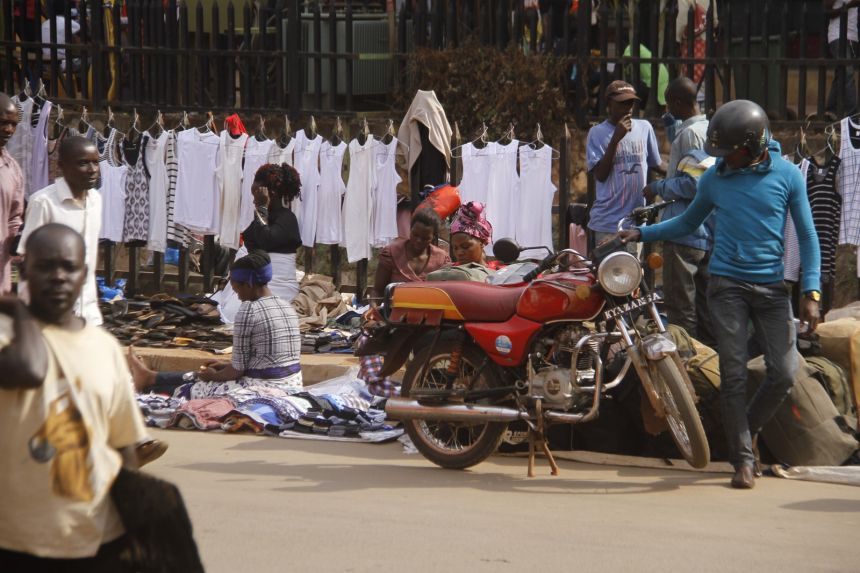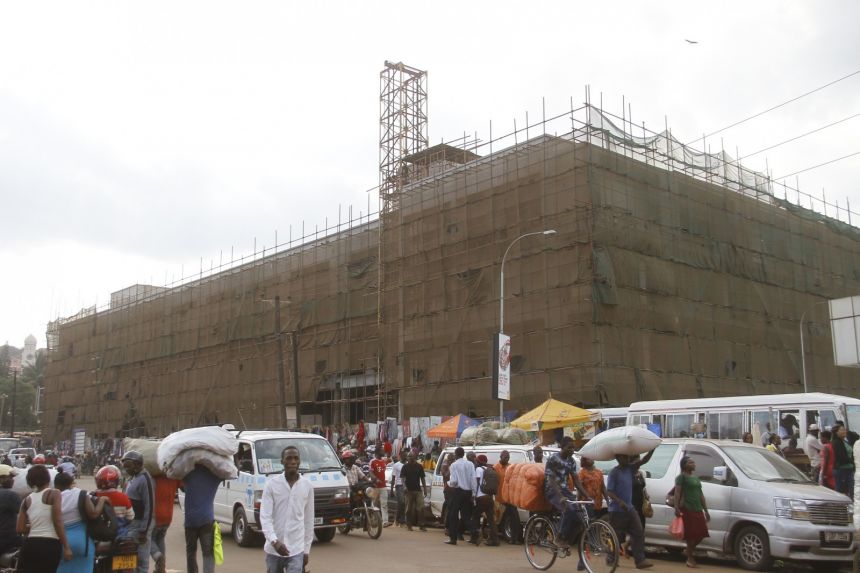
The avatar of this bubbling discontent is Erias Lukwago, a populist lawyer who was elected as Lord Mayor in 2011. He demanded a tax refund for traders, refused to approve the taxi fee and was arrested while protesting the eviction of vendors from one of the taxi parks. His posturing predictably irked the KCCA’s executive director, Jennifer Musisi, a hard-nosed technocrat dubbed the “iron lady’” by local press.
Two years into his term, Lukwago was impeached for “abuse of office” (the ruling specifically cited his resistance over licenses). It did his reputation no harm. This year he was handsomely re-elected with 75 percent of the vote — after launching his campaign, tellingly, at the Old Taxi Park.
“He’s our mayor, not their mayor,” says one driver, who didn’t want to be named. In part, Lukwago owes his popularity to national politics: He has promised to “dismantle the dictatorship” of Uganda’s long-time president, Yoweri Museveni, who is widely loathed in Kampala. But he also articulates a radical notion of accountability, which directly challenges the KCCA’s appointed officials.
The biggest complaint against the KCCA is not what they do, but how they do it. “They think that it is the state which hired them,” says Moses Kalule of the Kampala City Traders Association, which represents small businesses. “But remember we contribute money. It is our city, our roads.”
Opposition protests are quenched with tear gas. Plans to redevelop markets, ban street vendors and register boda bodas (motorbike taxis) have all met resistance. When it comes to revenue collection, the KCCA’s approach to enforcement is seen as arbitrary and unforgiving — a “witch hunt,” in the words of Kennedy Okello, a newly elected councilor.
KCCA officials deny any unfairness. “I don’t see why someone who is upright fears the regulations,” says Sam Sserunkuuma, director of revenue collection. The traders and taxi drivers do not own the city, he adds, listing the services from street cleaning to hospitals that their fees help to fund. “Accountability to the people is in the provision of services. We cannot call everybody to a rally.”
Back in the Old Taxi Park, some drivers have come to accept the Sh120,000 ($36 U.S.) fee. Others still say it is too high: They have bosses to pay, as well as expenses, and after the levy the typical driver takes home Sh15,000 ($4.50 U.S.) a day. They have seen little of the services which KCCA officials promise. The city’s wage bill has soared since the KCCA took over, gobbling up most of the extra revenue.
Ask about fairness, and taxi drivers scuff their feet on the ground. “The fees would be fair,” says one, “if only it wasn’t so dusty here.”
WHERE THE STREETS HAVE NO NAME
There is no dust at Acacia Mall. Its marble floors are spotless. A fashionable crowd, both Ugandans and Westerners, glide around its colonnades. The glitzy development opened two years ago in the wealthy suburb of Kololo, marketed at the urban elite. There’s only one problem: Like anything else built in the last seven years, it pays not a shilling of property tax.
For Kampala, an effective property tax is the Holy Grail. “It should be the main revenue source,” says Sam Sserunkuuma, KCCA director of revenue collection: He reckons the city could triple the amount it currently collects.
But tax officials are groping in the dark. The last property valuation was done in 2005, and revised in 2009. Though rental values have tripled in a decade, none of the gains have reached city coffers. New buildings like Acacia Mall do not officially exist.
And that’s just the start. Most of the city’s housing is informal and land ownership is often uncertain. Most streets don’t have names, and houses don’t have numbers. The property register is a confusing jumble.
No wonder that property tax falls far short of potential: though it is the largest source of revenue, it contributes barely more than taxi and parking fees, and has grown at a slower rate. That is a missed opportunity. A tax on property — or, even better, on land — makes sense for cities. It scoops up the windfall gains of lucky landowners, whose properties rise in value as amenities improve. Land and property, unlike income, can’t be hidden: A house, or a shopping mall, can’t be smuggled offshore.
A specific land tax has its own advantages. “It doesn’t tend to distort incentives in the marketplace,” points out George McCarthy, president of the Lincoln Institute of Land Policy, an American think tank. Indeed, a land tax would encourage developers to build up, rather than out, making land use more efficient. McCarthy suggests a range of other mechanisms to capture the value of land, from the sale of development rights to “betterment contributions,” where residents pay a fee to bring improvements like water or sewerage to their area.
Some of these schemes are too complex for Kampala at present. Most of the city is owned under a convoluted system of traditional land tenure, which separates ownership of buildings from ownership of the underlying land. But officials want to make a more standard property tax work. World Bank support is helping the KCCA to compile a database of buildings, using geographic information system (GIS) technology. When the mapping is complete, tax officials plan to apply a rough valuation of each property based on its location — a cheaper alternative to individual assessments.
There is one snag. Owner-occupied houses are exempt from property tax, following a cynical promise by the President during the 2006 elections. They make up 53 percent of all eligible properties, so the resulting losses are huge. Sserunkuuma describes the law as a “headache”: His officials have to traipse around town, verifying how buildings are being used. It also creates loopholes for tax evaders to exploit.
But only central government has the power to scrap the exemption. The KCCA’s best efforts have so far failed to coax a law change from Uganda’s self-interested politicians, who recently passed a bill to exempt themselves from income tax.
“Ask yourself, ‘where do the parliamentarians stay?’” says Patrick Musoke, KCCA director of strategy, pointing to their substantial property holdings in the city. Bernard Luyiga, a former councilor, is blunter. “The ones who have the money control the politics here,” he says.

“THE DEVIL IS IN THE DETAILS”
The KCCA has its faults, but ambition is not one of them. Consider its ideas for transport: a bus network, light rail and even, perhaps, cable cars to ferry commuters through the sky.
Part of the plan is a new transport hub. Sitting in his office at KCCA headquarters, Musoke gushes about the project. “It’s wonderful idea,” he says of the proposals in a new, 300-page, EU-funded report, which include multi-story parking, shopping and recreational space. And the intended site for this development? Nowhere else, of course, than the dusty Old Taxi Park.
But it won’t be paid for out of taxi fees. Even with a meatier property tax, Kampala doesn’t have the resources to fund lots of these chunky investments yet. Many cities will wrestle with similar problems as they strive to fulfill the promises of the New Urban Agenda in areas from housing to sustainability. The solution, Musoke muses, is to look elsewhere: to the private sector, to capital markets and to foreign donors.
Take the transport hub. One idea is to set up a public-private partnership (PPP): a long-term contract with a private company that would build and operate the development, earning revenue from parking fees. A national PPP Act, passed last year, strengthens the legal framework for such arrangements. The city’s strategic plan lists 14 other potential projects, from street lighting to primary schools.
But “the devil is in the details,” Musoke admits. PPPs may work for self-contained schemes with low capital requirements: areas such as solid waste management, in which Kampala has already signed deals with three private companies. For larger projects they are loaded with risk. Contracts are complex and opaque, with private investors demanding high returns of 15-20 percent. If things go wrong, as they often do, the government is left to pick up the pieces. PPPs “should not be considered a panacea,” experts at UN-Habitat warned in a recent policy paper.
That explains the enthusiasm for a municipal bond. It may not happen: City officials have been floating the idea for several years. But receiving an “A” rating last year removed a major obstacle. The next hurdle is national law, which limits the city’s borrowing to 10 percent of its revenues. Should that restriction be relaxed — and Musoke is optimistic that it will — the city plans to issue a project-specific bond for the transport hub, paid off with ring-fenced revenues
Debt carries its own risks. Bonds may be an option for “some of the bigger and better-run cities” in Africa, says Roland White of the World Bank, but he stresses the importance of a clear regulatory framework. In Dakar, Senegal, a planned bond was pulled just two days before the launch date last year, the victim of murky regulation and even murkier politics. Debt will have to be issued in local currency and the pool of potential investors is quite small. In any case, borrowing doesn’t generate revenue: It simply brings forward future income, which will one day have to be paid back.
That leaves donor assistance. Kampala is not short of foreign friends. The World Bank will spend over $200 million in Kampala this decade, mainly to upgrade roads and drainage systems. The money will be paid back over 40 years at concessional rates. Central government has also secured cheap Chinese cash for the planned light railway, which will link Kampala with surrounding districts.
When it comes to large-scale infrastructure, a developing city like Kampala must still abide by an Augustin-esque mantra: Let me be self-sustaining, but not yet. For all that, the thrust of reform is clear. Local revenues will be needed to pay for the day-to-day upkeep of donor-funded projects. In the long-run, as the New Urban Agenda will stress, cities must rely more on their own citizens.
Nobody likes paying taxes. Fees go up overnight, while the services they pay for take time to improve. “There is no magic bullet,” says Ananda Weliwita of UN-Habitat. As Kampala shows, beneath any reform lies the procedural plumbing: reorganizing, negotiating and changing attitudes.
All over Africa, cities puzzle over the same conundrums. Rwanda has a new electronic land register, which could help with taxation. Several Tanzanian cities have plumped up their revenues through canny administrative reforms. Lagos, in Nigeria, has patiently cultivated a tax-paying culture, with impressive results.
The lingering question, in Kampala and elsewhere, is who will bear the biggest burden. So far, at least, the wealthy properties on the city’s breezy hilltops have been relatively untouched by reform. “It’s much easier to go after the small guy,” says Nansozi Muwanga of Makerere University. “It’s much easier to go after the taxi driver, the lady who brings her green peppers on the sidewalk, the person who’s selling Chinese clogs.”
****
editor@independent.co.ug
 The Independent Uganda: You get the Truth we Pay the Price
The Independent Uganda: You get the Truth we Pay the Price




Very interesting article.
Wow, beautifully crafted article